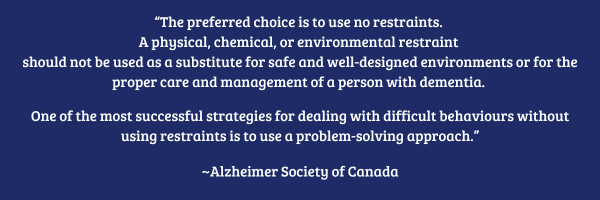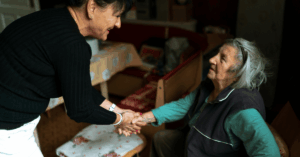In an alarming report published by CBC in September 2022, “about three in 10 New Brunswick nursing home residents were given antipsychotic medication without a diagnosis of psychosis during the early stages of the COVID-19 pandemic.” This was based on the data collected by CBC from the Canadian Institute for Health Information.
Antipsychotics refer to a category of drugs that are used to manage psychotic disorders such as schizophrenia. Psychosis commonly manifests as hallucinations, delusions, and paranoia.
It is important to emphasize that antipsychotics should only be given to those with a confirmed diagnosis of a psychotic disorder. Even then, it is important to understand that antipsychotics do not treat the underlying causes and prolonged use can have a negative impact on the individual’s health. It is not uncommon for individuals experiencing delirium, as well as those with a confirmed diagnosis of dementia to show signs of confusion or hallucinations. Further, not all dementia-related behaviours can be managed by antipsychotics.
Dementia Behaviours that Do Not Respond to Anti-Psychotics
Though individuals living with symptoms of dementia may also have a diagnosed psychotic disorder, not all individuals with dementia require or can benefit from antipsychotics. There are certain dementia behaviours where the use of antipsychotics has no effect.
Dementia-related behaviours that do not respond and will not respond to antipsychotics include:
- Sundowning
- Wandering
- Hoarding
- Repetitive behaviour/repeatedly asking the same question over and over again
- Stealing/hiding behaviour
- Loss of inhibition/poor judgment – saying or doing things inappropriately
- Withdrawing from social contacts/self-isolation
- Distress during bathing or personal care
It is important to be very specifically clear on why the use of antipsychotics should ever be used on an individual living with dementia, especially those without a clinical diagnosis of a psychotic disorder. The use of antipsychotics should only be considered if it can help improve their well-being or reduce the risk of harm to themselves or others. Antipsychotics should never be used to make work easier for their caregivers.
Using Chemical Restraints to Manage Dementia-Related Behaviours

It cannot be stressed enough that the use of any form of restraint, chemical or otherwise, should only be used as a last resort and only after all other alternatives have been considered and tried. Learn more about the Alzheimer Society of Canada’s position on the use of restraints here.
Chemical restraints are drugs that are used with the intention of restricting movement or modifying a behaviour (e.g., sedatives, tranquillizers).
Antipsychotics are not synonymous with chemical restraints. However, antipsychotics can be used as a form of chemical restraint. When used in this manner, antipsychotics are being used for its “side effect” also known as “off-label use” (i.e., modify behaviour or restrict movement), and not its intended desired effect, which is the management of a psychotic disorder.
Individuals living with dementia, and even those experiencing delirium, may show signs of hallucinations and delusions, but may not necessarily have a psychotic disorder. More often than not, confusion, hallucinations and other responsive behaviours seen among individuals living with dementia are triggered by an underlying infection, pain or an unmet need.
It is therefore highly critical to investigate what is causing the behaviour and treat the underlying conditions before resorting to any extreme chemical intervention.
Effective and Proven Non-Pharmacologic Approaches to Managing Dementia-Related Behaviours
Regardless of a person’s cognitive abilities, it is important to understand that behaviour is a form of communication. This is especially true for people living with symptoms of dementia especially those individuals who have lost their ability for language or communication.
Person-centered care is an approach that tailors care to the individual’s preferences, needs, and history. It recognizes that behaviors exhibited by individuals with dementia often have personal meanings. Taking the time to understand a person’s life history, preferences, and triggers can guide caregivers in finding non-pharmacological strategies to manage challenging behaviors effectively.
Examples of these non-pharmacological interventions include:
- Reminiscence Therapy: Encouraging individuals to talk about their past and share memories can help them feel valued and understood. This therapeutic approach often leads to reduced agitation and improved overall well-being.
- Music and Art Therapy: Engaging in creative activities can stimulate the brain and evoke positive emotions. Music and art therapies have been shown to alleviate anxiety, depression, and even aggression in individuals with dementia.
- Physical Activity: Regular physical exercise can improve mood, reduce anxiety, and enhance cognitive function. Structured physical activities or exercises tailored to an individual’s abilities can contribute to better behavior management.
- Aromatherapy: Certain scents, such as lavender, have a calming effect and can help reduce agitation and anxiety. Aromatherapy, when used appropriately, can offer a non-invasive way to manage behaviors.
When a person with dementia exhibits responsive behaviour, more often than not, it is because of an unmet need.
Quality of life and living with dignity is being able to support those under our care to remain independent and socially engaged, whenever possible, and however long it is possible.
Modifying their behaviour or restricting their movement merely for the intention of making their care easier should never be a consideration. When an individual starts to exhibit responsive behaviours, our first question should always be, “Why?” Behaviour is a form of communication. It is our job, as their caregiver, to investigate what they are trying to communicate to us.
To learn more about how we manage dementia-related behaviours by gathering the Ph.A.C.T.S™ contact us at Info@DementiaSolutions.ca
At Dementia Solutions, we’ve made it our mission to demystify dementia behaviour and continue to explore person-centred, creative, non-pharmacological solutions to manage dementia-related behaviours. We believe that awareness creation and skill-building through education is the most effective and powerful tool we have to promote and maintain the well-being of both the person with dementia and their caregiver.
If you need support in your caregiving experience or would like to learn more about our educational opportunities, please reach out to us at Info@DementiaSolutions.ca and we would be more than happy to support you.
DISCLAIMER:
The contents of this blog are provided for information purposes only. They are not intended to replace clinical diagnosis or medical advice from a health professional.



